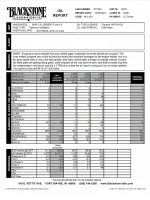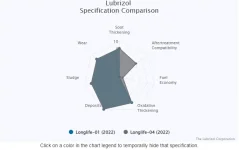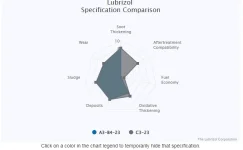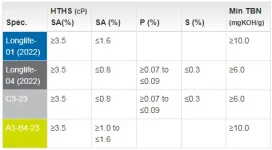It wouldn't be. UK moved to ULSG over a decade agoIn 2020 the B58 isn’t specced for any LL01 oil in the UK, I don’t know when this was changed or if they ever specced LL01 in the UK and Europe
You are using an out of date browser. It may not display this or other websites correctly.
You should upgrade or use an alternative browser.
You should upgrade or use an alternative browser.
BMW B58 Engine Oil Recommendation
- Thread starter afree
- Start date
And BMW replaced LL01 with LL04, just like they replaced LL98It wouldn't be. UK moved to ULSG over a decade ago
No they didn’t. Yes Longlife-01 replaced Longlife-98 (just as that did for “Special Oils”) but it isn’t a replacement for Longlife-04. They were, and are still two different but current approvals. If it were a replacement then LL-01 would disappear just like LL-98 did.And BMW replaced LL01 with LL04, just like they replaced LL98
That doesn’t mean you can’t use it as a substitution but it’s not a replacement.
LL01 wasn't retired. LL04 was the result of tighter emissions standards (DPF, TWC) in certain markets which required ULSG and ULSD.And BMW replaced LL01 with LL04, just like they replaced LL98
Last edited:
LL04 is no longer used by BMW Dealers.LL01 wasn't retired. LL04 was the result of tighter emissions standards (DPF, TWC) in certain markets which required ULSG and ULSD.
Just like LL98, LL01 was superseded by LL04
So if BMW say use the newer spec why would you want to use an inferior oil?
You can get LL04 in anything from 0w30 to 5W40 and various viscosities in between.
So what is you logic behind using the older oil spec?
Makes no sense
edyvw
$50 site donor 2025
It seems a lot of things does not to make sense to you.LL04 is no longer used by BMW Dealers.
Just like LL98, LL01 was superseded by LL04
So if BMW say use the newer spec why would you want to use an inferior oil?
You can get LL04 in anything from 0w30 to 5W40 and various viscosities in between.
So what is you logic behind using the older oil spec?
Makes no sense
Just bcs. dealers don’t use it, doesn’t mean it is not current.
Also, you really have a hard time understanding that LL04 didn’t superseded LL01. LL01 was introduced in 2001 and LL04 in 2004 for DPF equipped diesels. Both approvals went through 6-7 updates, last one in 2022. BMW used LL01 in Europe (EU+ several other countries) until 2009. So, not LL04 didn’t superseded. Since 2009 LL01 was used in the US, Some European countries, Russia, whole Africa, most Asia, South America. It is STILL used there!!!
LL01 is NOT inferior oil. The fact you are saying such BASIC thing here, shows actually your ignorance about this issues.
Try first reading difference between these two oils. There are numerous topics on it.
Your post is what makes no sense. What a convoluted spatter of nonsense.LL04 is no longer used by BMW Dealers.
Just like LL98, LL01 was superseded by LL04
So if BMW say use the newer spec why would you want to use an inferior oil?
You can get LL04 in anything from 0w30 to 5W40 and various viscosities in between.
So what is you logic behind using the older oil spec?
Makes no sense
Sure but that's because BMW is under regulatory emissions/fuel efficiency pressure in YOUR market.LL04 is no longer used by BMW Dealers.
Just like LL98, LL01 was superseded by LL04
So if BMW say use the newer spec why would you want to use an inferior oil?
You can get LL04 in anything from 0w30 to 5W40 and various viscosities in between.
So what is you logic behind using the older oil spec?
Makes no sense
And operative information being that they are both current approvals, unlike Longlife-98. The other poster is making truly idiotic arguments.LL01 is based on ACEA A3/B4 while LL04 is based on ACEA C3
As many others here have already tried to explain-
LL04 did not supercede LL01.
LL01 is a full-SAPS specification in general use worldwide for a wide span of model years which has been updated from time to time in order to stay current. (There was a major revision in 2018 to address N20 engine timing chain/guide issues)
LL04 is a low-SAPS specification required by vehicles with particulate filters (diesel or gasoline). It was found early in LL04's lifetime that North American fuels were too rich in sulphur to use low SAPS oils for the desired oil change intervals, so LL04 use was prohibited in gasoline engines outside of EU.
Since then, sulphur levels have been lowered in North America and, although BMW is unchanged in prohibiting LL04 outside of EU, it is the subject of debate for many BMW owners with direct injection engines to run the LL04 low SAPS specification to reduce intake valve deposits.
Although it is likely far from the latest revision of the document, I attach a BMW publication I saved from the past describing all of the appropriate applications of the various BMW specs across geographies and engine model line ups.
LL04 did not supercede LL01.
LL01 is a full-SAPS specification in general use worldwide for a wide span of model years which has been updated from time to time in order to stay current. (There was a major revision in 2018 to address N20 engine timing chain/guide issues)
LL04 is a low-SAPS specification required by vehicles with particulate filters (diesel or gasoline). It was found early in LL04's lifetime that North American fuels were too rich in sulphur to use low SAPS oils for the desired oil change intervals, so LL04 use was prohibited in gasoline engines outside of EU.
Since then, sulphur levels have been lowered in North America and, although BMW is unchanged in prohibiting LL04 outside of EU, it is the subject of debate for many BMW owners with direct injection engines to run the LL04 low SAPS specification to reduce intake valve deposits.
Although it is likely far from the latest revision of the document, I attach a BMW publication I saved from the past describing all of the appropriate applications of the various BMW specs across geographies and engine model line ups.
Attachments
-
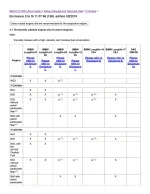 TIS - Technically Suitable Engine Oils-0001.webp58 KB · Views: 47
TIS - Technically Suitable Engine Oils-0001.webp58 KB · Views: 47 -
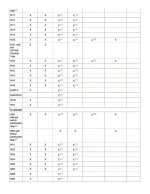 TIS - Technically Suitable Engine Oils-0002.webp42.3 KB · Views: 48
TIS - Technically Suitable Engine Oils-0002.webp42.3 KB · Views: 48 -
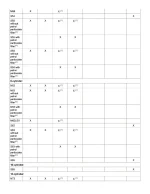 TIS - Technically Suitable Engine Oils-0003.webp34.4 KB · Views: 38
TIS - Technically Suitable Engine Oils-0003.webp34.4 KB · Views: 38 -
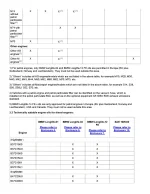 TIS - Technically Suitable Engine Oils-0004.webp69.1 KB · Views: 34
TIS - Technically Suitable Engine Oils-0004.webp69.1 KB · Views: 34 -
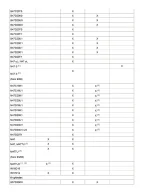 TIS - Technically Suitable Engine Oils-0005.webp39.9 KB · Views: 29
TIS - Technically Suitable Engine Oils-0005.webp39.9 KB · Views: 29 -
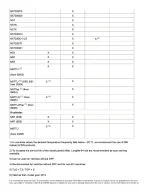 TIS - Technically Suitable Engine Oils-0006.webp50.2 KB · Views: 26
TIS - Technically Suitable Engine Oils-0006.webp50.2 KB · Views: 26 -
 TIS - Technically Suitable Engine Oils-0007.webp3.1 KB · Views: 52
TIS - Technically Suitable Engine Oils-0007.webp3.1 KB · Views: 52
Low SAPS is currently spec'd by every Euro car manufacturer from Alfa Romeo to Porsche, I don't see any lingering reason to use LL01 in your 2013+ petrol powered BMW unless you're tuned and tracking - or if the fuel quality in your area is poor.
Low SAPS is currently spec'd by every Euro car manufacturer from Alfa Romeo to Porsche, I don't see any lingering reason to use LL01 in your 2013+ petrol powered BMW unless you're tuned and tracking - or if the fuel quality in your area is poor.
It's kind of becoming redundant if you use an SP rated LL-01 anyway. They're not quite as low as LL-04 but significantly lower than older formulas.
BMW has not helped the situation by their naming convention. If they had instead used something like VAG 502/504/508, or the Porsche equivalents, C20, C30, A40, where it is clear the spec applies to certain engines, people would not jump to the conclusion that the year number following the LL automatically encompasses all lower year numbers.As many others here have already tried to explain-
LL04 did not supercede LL01.
LL01 is a full-SAPS specification in general use worldwide for a wide span of model years which has been updated from time to time in order to stay current. (There was a major revision in 2018 to address N20 engine timing chain/guide issues)
LL04 is a low-SAPS specification required by vehicles with particulate filters (diesel or gasoline). It was found early in LL04's lifetime that North American fuels were too rich in sulphur to use low SAPS oils for the desired oil change intervals, so LL04 use was prohibited in gasoline engines outside of EU.
Since then, sulphur levels have been lowered in North America and, although BMW is unchanged in prohibiting LL04 outside of EU, it is the subject of debate for many BMW owners with direct injection engines to run the LL04 low SAPS specification to reduce intake valve deposits.
Although it is likely far from the latest revision of the document, I attach a BMW publication I saved from the past describing all of the appropriate applications of the various BMW specs across geographies and engine model line ups.
I have one good reason, not having to have separate oils. With a 1992 535i (M30), 2016 X3 3.5i (N55), 1996 Toyota Landcruiser (1FZE), 2016 Touareg (3.6 VR6), and 2016 Cayenne S (3.6 twin Turbo), a BMW LL-01/Porsche A40 lets me have one oil that works for them all. That said, for my friend that has a 2011 328i (N52) and 2017 X3 3.5 (N55), I suggested running a LL-04.Low SAPS is currently spec'd by every Euro car manufacturer from Alfa Romeo to Porsche, I don't see any lingering reason to use LL01 in your 2013+ petrol powered BMW unless you're tuned and tracking - or if the fuel quality in your area is poor.
I have one good reason, not having to have separate oils. With a 1992 535i (M30), 2016 X3 3.5i (N55), 1996 Toyota Landcruiser (1FZE), 2016 Touareg (3.6 VR6), and 2016 Cayenne S (3.6 twin Turbo), a BMW LL-01/Porsche A40 lets me have one oil that works for them all. That said, for my friend that has a 2011 328i (N52) and 2017 X3 3.5 (N55), I suggested running a LL-04.
Never really understood this strategy unless you're buying drums. If you need to buy jugs why does it make a difference if you have one of two different kinds, or two of the same?
The 40 grades and some 30s don’t have lower levels. There’s also almost no LL-01 30 grades left on the market and the most widely available one (M1 FS 5W-30) prints API SL (API SP Engine Test Requirements) on the bottle to signify it would be SP but can’t because of the ZDDP levels.It's kind of becoming redundant if you use an SP rated LL-01 anyway. They're not quite as low as LL-04 but significantly lower than older formulas.
The only true lower SAPS oil is BMW’s LL-01FE and maybe the Motul 0W-30 FE. .
Availability and cost, warranty if in warranty.Low SAPS is currently spec'd by every Euro car manufacturer from Alfa Romeo to Porsche, I don't see any lingering reason to use LL01 in your 2013+ petrol powered BMW unless you're tuned and tracking - or if the fuel quality in your area is poor.
edyvw
$50 site donor 2025
N52 engine is port injection. There is no any reason to run LL04. If you want any sort of benefit of LL04, run it in N55.I have one good reason, not having to have separate oils. With a 1992 535i (M30), 2016 X3 3.5i (N55), 1996 Toyota Landcruiser (1FZE), 2016 Touareg (3.6 VR6), and 2016 Cayenne S (3.6 twin Turbo), a BMW LL-01/Porsche A40 lets me have one oil that works for them all. That said, for my friend that has a 2011 328i (N52) and 2017 X3 3.5 (N55), I suggested running a LL-04.
Similar threads
- Replies
- 152
- Views
- 21K
- Replies
- 12
- Views
- 482
- Replies
- 12
- Views
- 790
- Replies
- 11
- Views
- 838
- Replies
- 29
- Views
- 4K

